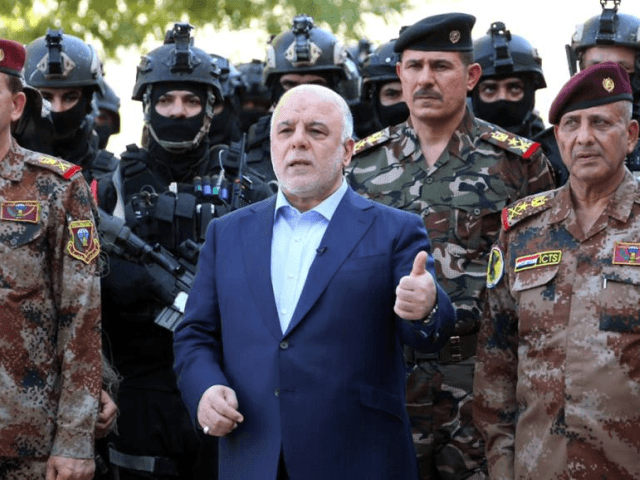Iraqi Prime Minister Haider al-Abadi has once again demanded that the Kurdish armed forces, the Peshmerga, allow him to take over as their commander-in-chief or significantly diminish in size, apparently taking advantage of Kurdish President Masoud Barzani’s announcement that he would step down from his role on November 1.
The Peshmerga are widely considered one of the most successful forces on the ground against the Islamic State, playing pivotal roles in the liberation of Mosul and some of the northern Nineveh region and protecting Erbil, the capital of the Kurdistan Regional Government (KRG) and home to thousands of displaced Christians, Yazidis, and other minorities.
In an interview with the UK Independent, Abadi reiterated a demand he made weeks ago in the immediate aftermath of the KRG holding a non-binding independence referendum: either the Peshmerga accept him, a Shiite Arab, as their leader, or they mostly disband.
“He wants the Peshmerga either to become part of the Iraqi government security forces or a small local force,” the Independent notes. “Mr Abadi is determined to end the quasi-independence of the Kurdistan Regional Government (KRG) that dates back to Saddam Hussein’s defeat after his invasion of Kuwait in 1991.”
Abadi himself is quoted as insisting that the Peshmerga are not as strong as their reputation indicates and that he will not pay Peshmerga fighters who function as an independent Kurdish military.
“I am prepared to pay those Peshmerga under the control of the federal state. If they want to have their local small force—it must not be that large—then they must pay for it,” he tells the newspaper.
Abadi made a similar demand at the beginning of October, following the invasion of Kurdistan by Iraqi soldiers and the Popular Mobilization Forces (PMF), a coalition of Iran-backed, mostly Shiite militias. While the PMF are legally part of the Iraqi military and, thus, under Abadi’s control, both the Kurds and the government of Iran have claimed that Iran funds and controls their movements.
“I call on Peshmerga Forces to work together. … become[s] a part of the Iraqi national forces, under the Iraqi Federal Government’s command, and to work with ours forces to implement Iraq’s authority in all these areas,” Abadi said in early October. “We do not want any confrontation or clashes, but we must impose federal authority, and no one can violate the federal authority in these areas.”
The Peshmerga have long regarded the Iraqi military as weak, inefficient, and unconcerned with Kurdish issues. They cite examples such as the Islamic State invasion of Kirkuk in 2014, which was immediately followed by the Iraqi army fleeing. The Peshmerga stepped in, defeated ISIS, and controlled Kirkuk until the PMF invaded this month.
While Abadi credits the Iraqi military with the capture of Kirkuk, a multi-ethnic city traditionally outside Kurdistan’s borders, both the Peshmerga and the Iranian government credit Iran with the intervention. “Chief of staff for Iran’s Supreme Leader, Mohamadi Gulpaigani, had stated that the fall of Kirkuk was based on instructions from Ayatollah Khamenei that were carried out by the commander of the Quds Force [Qasem Soleimani] in order to spoil an American-Israeli plan to create an independent Kurdistan in Iraq,” the Kurdish outlet Rudaw explains.
Baghdad shut down Rudaw’s television broadcast this week.
Amid clear Iranian military activity against a staunch U.S. ally, the United States has largely abstained from weighing in. President Donald Trump told reporters he would refuse to “take sides” in the assault on the Kurds.
The Iraqi government, meanwhile, insists that “discussions” with the KRG are trending in a “positive” direction.
“There currently are no big problems between the central and Kurdistan Regional government, except for the federal government supervising border ports, airports and oil fields in accordance with Article 112 of the Iraqi constitution which states that oil is the property of the Iraqi nation,” Iraqi Interior Minister Qasim Ahraji said on Tuesday.

COMMENTS
Please let us know if you're having issues with commenting.